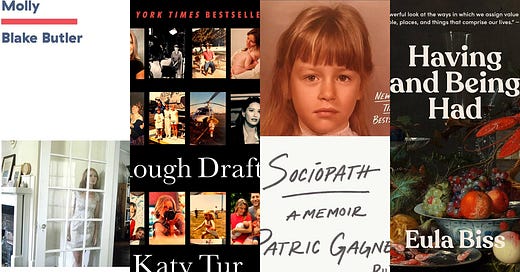The Times said it “makes you look up at the sky, fearful of what might fall out of it,” and Slate said, “just read it.”
In Blake Butler’s memoir, “Molly,” he writes about his late wife, the poet Molly Brodak, and what he discovers about her, and their relationship, in the aftermath of her death.
The first chapter, which depicts their final morning together, is urgent and devastating. I wept from nearly start to finish. Butler discovers his wife’s suicide note after returning home from a run. He immediately sets out to find her, searching through the trees and overgrown grass of the park near their home—and then he does.
My review is mixed. The book is complicated. Their relationship seemed unhealthy. Brodak had secrets that Butler uncovers: She cheated on him throughout their marriage, and lied, constantly. But she’s not here to tell her side. He’s no angel either, noting his anger issues and peculiarities. Either would be difficult to live with. I thought the first half was close to perfect. It’s breathless, sharp, and poetic. It’s laser-focused. The second half unravels. Meanders. Gets a little wacky. I find the ethical questions, should he have exposed her secrets, publicized her suicide note, a little trite. I’m much more curious about how we pay tribute (and it’s clear to me that this book is a tribute) to complicated people, and how we are able to weave together conflicting feelings of love, awe, grief, anger, and forgiveness.
What else I read last month:
I got an early copy of Ramin Setoodeh’s upcoming book about The Apprentice, which features numerous sit down interviews with Donald Trump, but more on that soon. I’d recommend pre-ordering it while you can.
I read Patric Gagne’s memoir about being a sociopath, aptly titled Sociopath. It’s a trip. She notes upfront that she has changed names, timelines, and even dialogue—and you can tell. Some of the conversations feel a little too Sorkinesque, a little too on the nose. I don’t think most people are that sharp and witty, and I don’t think most people can recall conversations verbatim, but I had fun reading these exchanges. Gagne also has a tendency to bask a little too long in the highlight reel of her bad behavior. I imagine her narcissism could be a turn off for some readers. Her diagnosis isn’t news; she wrote about being a sociopath for the NYT in 2020. Reading her Modern Love article seems like a good way to gauge your interest in reading her memoir.
I also read journalist Katy Tur’s memoir, Rough Draft. If her name sounds familiar, that’s because it should be. Trump made Tur famous when she was assigned to cover his 2016 campaign, often singling her out and sparring with her. Her first book, Unbelievable, unpacks this experience.
But back to Rough Draft: Another trip! Her parents are the journalists who filmed—while hanging out of a helicopter—the O.J. Simpson police chase, the Los Angeles riots, and Madonna and Sean Penn’s Malibu wedding. In her second memoir, Tur takes us through her upbringing, the unraveling of her parents’ news business and marriage, and her ascent into TV journalism. While airing the family laundry, Tur also reveals her rocky relationship with her dad, who came out as trans in 2013, while Tur was covering the Boston bombings. She is painfully honest about the struggles of being a working mom, and brings us into the basement that she and her broadcast husband had to work from during COVID. Her story is truly a ride.
I finally read Eula Biss’s Having and Being Had, which came out in 2021 and has been on my shelf for nearly just as long. It’s a fragmented book-length essay, almost poetic, about money and capitalism and class from the lens of a privileged, white woman. Biss has finally bought a home, what used to be a pipe dream for a struggling writer is now reality for a tenured Northwestern professor. This change in status, becoming a homeowner, prompts her to reevaluate her relationships to money and labor. She grapples with what “work” means. How she spends her time and what constitutes as art. Biss introduces a lot of interesting concepts, but I’m not sure if she offers any solutions to our current capitalist hellscape.




